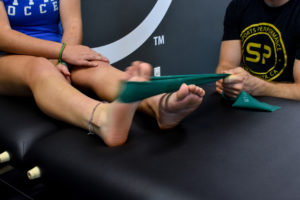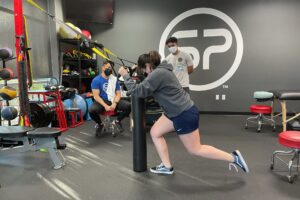I was speaking to a friend’s mother at a party this weekend and she was going through a story of how she is dealing with rotator cuff issues and her doctor thinks that she will eventually need to have surgery to resolve her issues. As I delved more into the story and what she has been doing to help; it became more complex. As we got more into it, she wanted to know, does she need shoulder surgery to fix her problems?
Disclaimer: I am writing this from a biased viewpoint. I am a physical therapist and I believe that all other options should be exhausted before surgical intervention is warranted.
As always with neuromusculoskeletal disorders, the answer isn’t as easy as yes or no; there are the pros and cons of surgery, the multifactorial nature of how the problem began, current function, current and future needs, age, health status, timeline, etc, it could go on and on.
My friend’s mother has currently been going to physical therapy for her shoulder issues. She stated that it has been helping but that she is still having difficulty reaching overhead and with rotating her arm. She had gone to physical therapy for seven sessions.
Have you tried everything else, have you worked on range of motion, have you strengthened the you know what out of your shoulder? Because you definitely should do these before considering surgery.
There is a time and a place for shoulder surgery to repair rotator cuff muscles or tendons; an acute tear in a younger individual that wants to get back to high level activity, could be an indication for surgery. Surgery for a degenerative tear in a seasoned population that doesn’t necessarily need to get back to high level activity? Surgery may or may not be indicated in the last scenario and it definitely depends on a lot of factors and one is: have you tried everything else, have you worked on range of motion, have you strengthened the you know what out of your shoulder? Because you definitely should do these before considering surgery.
Anecdotal story: one of my first clients at Sports Performance was a lady who came in after an awkward catch while performing a snatch. She came in and told me her story and when we got to the part where I asked her to lift up her arm, she shrugged her shoulder up and lifted her arm approximately a quarter of the way up.

This last weekend she performed in an Olympic weightlifting competition. She thought that she was going to have shoulder surgery ten months ago. *All credit goes to her, she was out there strengthening her shoulder, pushing the limits, some days she did CrossFit in the morning and Olympic weightlifting in the evening; all the while she was doing the range of motion and strengthening exercises I had given her.*
There is a time and a place for shoulder surgery to repair rotator cuff muscles or tendons.
Going back to the conversation that started this blog: should my friend’s mom have shoulder surgery? I told her that she may eventually elect to undergo surgery and that is a decision that she can make with her health care team. I also stated that it is a serious surgery and that she may not need it. There is new research coming out all the time that individuals HAVE rotator cuff tears and they have no symptoms and are full functioning. I have also seen this in clinical practice; individuals can gain back full range of motion and function without surgical intervention. It takes hard work and some time. Here are my tips for helping your shoulder while you are considering how to proceed.
Normalize your range of motion
Strengthen your shoulder
Give it some time and then maybe some more time.
This will be painful, it may take a long time, anywhere from six months to a year for you to find the upper limits of how much function you will gain back.
In conclusion, shoulder surgery is a serious operation and decision; it should be made with consideration to a multitude of factors and can be discussed with your health care team. I do know that before it is undertaken; and I would tell my family members and my clients the same thing: do everything in your power to gain back their range of motion, strength and function before you make the decision and that may take some time.
As always, I hope this helps! If you have any questions or would like to read about certain topics, send us an email at TeamSP@SportsPerformancePT.com.
-Dr. Nick Schroeder, PT, DPT
For more tips on optimizing athletic performance FOLLOW US on:
- Instagram: http://www.instagram.com/SportsPerformancePT
- Facebook: http://www.facebook.com/SportsPerformancePT
- YouTube: http://www.youtube.com/c/SportsPerformancePT












